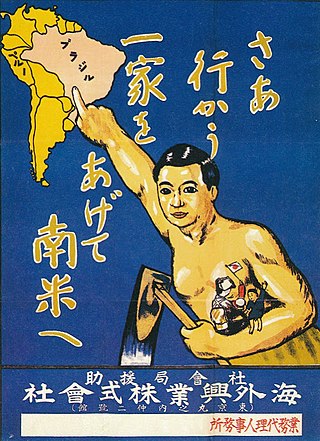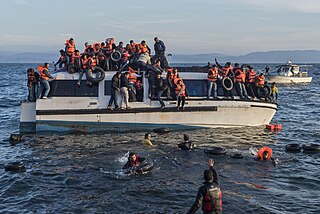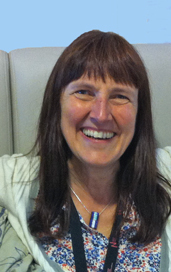
The International Organization for Migration (IOM) is a United Nations agency that provides services and advice concerning migration to governments and migrants, including internally displaced persons, refugees, and migrant workers.

A refugee, conventionally speaking, is a person who has lost the protection of his or her country of origin and who cannot or is unwilling to return there due to well-founded fear of persecution. Such a person may be called an asylum seeker until granted refugee status by the contracting state or the United Nations High Commissioner for Refugees (UNHCR) if they formally make a claim for asylum.

Emigration is the act of leaving a resident country or place of residence with the intent to settle elsewhere. Conversely, immigration describes the movement of people into one country from another. A migrant emigrates from their old country, and immigrates to their new country. Thus, both emigration and immigration describe migration, but from different countries' perspectives.

Human migration is the movement of people from one place to another with intentions of settling, permanently or temporarily, at a new location. The movement often occurs over long distances and from one country to another, but internal migration is also possible; indeed, this is the dominant form of human migration globally. Migration is often associated with better human capital at both individual and household level, and with better access to migration networks, facilitating a possible second move. It has a high potential to improve human development, and some studies confirm that migration is the most direct route out of poverty.Age is also important for both work and non-work migration. People may migrate as individuals, in family units or in large groups. There are four major forms of migration: invasion, conquest, colonization and emigration/immigration.

An internally displaced person (IDP) is someone who is forced to leave their home but who remains within their country's borders. They are often referred to as refugees, although they do not fall within the legal definitions of a refugee.

Forced displacement is an involuntary or coerced movement of a person or people away from their home or home region. The UNHCR defines 'forced displacement' as follows: displaced "as a result of persecution, conflict, generalized violence or human rights violations".

Environmental migrants are people who are forced to leave their home region due to sudden or long-term changes to their local or regional environment. These changes compromise their well-being or livelihood, and include increased drought, desertification, sea level rise, and disruption of seasonal weather patterns. Though there is no uniform, clear-cut definition of environmental migration, the idea is gaining attention as policy-makers and environmental and social scientists attempt to conceptualize the potential social effects of climate change and other environmental degradation, such a deforestation or overexploitation.
There is a history of persecution of Muslims in Myanmar that continues to the present day. Myanmar is a Buddhist majority country, with significant Christian and Muslim minorities. While Muslims served in the government of Prime Minister U Nu (1948–63), the situation changed with the 1962 Burmese coup d'état. While a few continued to serve, most Christians and Muslims were excluded from positions in the government and army. In 1982, the government introduced regulations that denied citizenship to anyone who could not prove Burmese ancestry from before 1823. This disenfranchised many Muslims in Myanmar, even though they had lived in Myanmar for several generations.
The Refugee Studies Centre (RSC) was established in 1982, as part of the University of Oxford's Department of International Development, in order to promote the understanding of the causes and consequences of forced migration and to improve the lives of some of the world's most marginalised people. Its philosophy is to "combine world-class academic research with a commitment to improving the lives and situations for some of the world's most disadvantaged people".
Satvinder Singh Juss FRSA, is a British academic and professor. He is professor of law at King's College London and a barrister-at-law in Gray's Inn. He has published widely on the subjects of migration and international human rights law.
Carolyn Makinson CBE is former executive director of International Rescue Committee UK (IRC-UK), and senior vice-president-Europe, IRC, positions she held from September 2010 to June 2014. Prior to these positions, she was executive director of the Women's Refugee Commission. She grew up in Derbyshire, England, and has lived at various times in London, Brussels, Cairo, and several places in the US. She now lives in Hastings-on-Hudson, NY, with her husband, Terry Walker.
Elizabeth G. Ferris is a senior fellow in the Foreign Policy Studies Program at the Brookings Institution in Washington, D.C. and serves as the co-director of the Brookings-LSE Project on Internal Displacement. In addition to her positions within the Brookings Institution, Ferris is an adjunct associate professor at Georgetown University’s School of Foreign Service. She is also a commissioner of the Women's Refugee Commission, a distinguished author and a lifelong humanitarian.
Institute for the Study of International Migration is a private research institute located in Washington, DC. Founded in 1998 as part of Georgetown University's School of Foreign Service, it is associated with the Georgetown University Law Center. The Institute for the Study of International Migration (ISIM) is an innovative multidisciplinary center that studies the social, economic, environmental, and political dimensions of international migration.
Migration studies is the academic study of human migration. Migration studies is an interdisciplinary field which draws on anthropology, prehistory, history, economics, law, sociology and postcolonial studies.

Margunn Bjørnholt is a Norwegian sociologist and economist. She is a research professor at the Norwegian Centre for Violence and Traumatic Stress Studies (NKVTS) and a professor of sociology at the University of Bergen.

Alexander Betts is Professor of Forced Migration and International Affairs, William Golding Senior Fellow in Politics at Brasenose College, and Associate Head of the Social Sciences Division at the University of Oxford.
The Journal of Refugee Studies is a quarterly peer-reviewed academic journal publishing research on forced migration. It was established in 1988 by the Refugee Studies Centre at the University of Oxford, with its first issue published that May. It is published by Oxford University Press in association with the Refugee Studies Centre. The editors-in-chief are Simon Turner and Megan Bradley. According to the Journal Citation Reports, the journal has a 2021 impact factor of 2.966, ranking it 10th out of 20 journals in the category "Ethnic Studies" and 16th out of 29 in the category "Demography". The journal provides a forum for exploration of the complex issue of forced migration and local, national, regional and international responses.
Susan Lee McGrath is a Professor Emerita in the School of Social Work at York University and former director of York's Centre for Refugee Studies.

Climate migration is a subset of climate-related mobility that refers to primarily voluntary movement driven by the impact of sudden or gradual climate-exacerbated disasters, such as “abnormally heavy rainfalls, prolonged droughts, desertification, environmental degradation, or sea-level rise and cyclones.” The majority of climate migrants move internally within their own countries, though a smaller number of climate-displaced people also move across national borders.
Oxford Monitor of Forced Migration (OxMo) is a biannual publication engaging in a global intellectual dialogue about forced migration, supported by the Refugee Studies Centre at the University of Oxford.











